- Home
- Robert Fulghum
It Was On Fire When I Lay Down On It Page 2
It Was On Fire When I Lay Down On It Read online
Page 2
Someone found him an obscure job in the back offices of the Treasury Department in Washington, and he finished out the last five years of his life as a menial file clerk. He wasn’t very good at that, either. His heart was not in it.
John Pierpont died a failure. He had accomplished nothing he set out to do or be. There is a small memorial stone marking his grave in Mount Auburn Cemetery in Cambridge, Massachusetts. The words in the granite read: POET, PREACHER, PHILOSOPHER, PHILANTHROPIST.
From this distance in time, one might insist that he was not, in fact, a failure. His commitments to social justice, his desire to be a loving human being, his active engagement in the great issues of his times, and his faith in the power of the human mind—these are not failures. And much of what he thought of as defeat became success. Education was reformed, legal processes were improved, credit laws were changed, and, above all, slavery was abolished once and for all.
Why am I telling you this? It’s not an uncommon story. Many nineteenth-century reformers had similar lives—similar failures and successes. In one very important sense, John Pierpont was not a failure. Every year, come December, we celebrate his success. We carry in our hearts and minds a lifelong memorial to him.
It’s a song.
Not about Jesus or angels or even Santa Claus. It’s a terribly simple song about the simple joy of whizzing through the cold white dark of wintersgloom in a sleigh pulled by one horse. And with the company of friends, laughing and singing all the way. No more. No less. “Jingle Bells.” John Pierpont wrote “Jingle Bells.”
To write a song that stands for the simplest joys, to write a song that three or four hundred million people around the world know—a song about something they’ve never done but can imagine—a song that every one of us, large and small, can hoot out the moment the chord is struck on the piano and the chord is struck in our spirit—well, that’s not failure.
One snowy afternoon in deep winter, John Pierpont penned the lines as a small gift for his family and friends and congregation. And in doing so left behind a permanent gift for Christmas—the best kind—not the one under the tree, but the invisible, invincible one of joy.
(Postscript. In the winter of 1987, in the Methow Valley of the Cascade Mountains of Washington State, I finally got a long-held wish. The snow was three feet deep, the temperature hung at zero, the sky was clear, the sleigh was open, the horse was dappled gray with red harness and bells. And we dashed over the snow, laughing all the way.
Thanks, John Pierpont. Every word of the song is true.)
IF YOU ARE NOW OR HAVE EVER BEEN THE OWNER OF a dog, do not, I repeat, DO NOT read any further. Move on to the next chapter. Because if you do read what’s coming, it will make you unhappy. And you will think ill of me, and you won’t understand it, anyway. (Not everything in this book is for everybody, so trust me.)
If, however, you don’t have a dog and don’t want one, then we need to talk. What I am about to say speaks for a voiceless minority whose point of view never appears in the media. It is censored for fear of offending the dogworld.
I don’t have any pets. None. Neither dog nor cat nor bird nor fish. Nevertheless, I am a reasonably responsible citizen, behave myself in public, pay my taxes, go to church sometimes, and am kind to children and old people alike. I love my family and they love me. But pets are not my thing. And I especially do not like dogs.
Once, at a large dinner party, I said that. Said I didn’t like dogs. Said it a little louder than I intended, actually, but I really wasn’t looking for trouble. I know the score on this subject.
The sudden silence made my ears ring. I could not have drawn more attention to myself if I had stood up on a chair and screamed “I HAVE RABIES!” Some of the people present give me a wide berth still.
Now, it is not a requirement that in order to be a good human being you must have a dog around the house. The Bible doesn’t say, “Thou shalt keep dogs in thy abode to be blessed in My sight.” The Book doesn’t have much to say about pets, actually. Neither are dogs mentioned in the Declaration of Independence, the Constitution, or the Pledge of Allegiance. You can go to heaven and be elected to public office without a dog.
(Maybe not elected president, though. Do you notice that all presidents have a dog? There is always a First Dog. Or two or three. You have to have a dog to be president, I guess. I still love old Lyndon Johnson for picking up his beagles by their ears and swinging them around while the dogs bayed. “They love it—it’s good for them,” said Lyndon. I think he based his Asian policy on the same premises, but that’s a touchy subject and I digress.)
So what have I got against dogs? I’ll explain.
First of all, for reasons I cannot explain, I have a congenital condition called “Pet Magnetism.” Though I don’t want to be near dogs, they are drawn to me with great force. The big ugly snarly biting ones go for me in a big way. And I can handle that. But all the rest of them seek me out as well. The wiggly tail-wagging slobbery ones want to be near my hands and face and lick and drool and breathe. I mind my own business, but they jump up on me and paw me and woof a lot. Uninvited. I swear it. I don’t ask for any of this. And I don’t do any of that to them, either.
Then there is the matter of doggy poo. I will avoid details except to say I seem to have a case of magnetism in this area as well. It happens so often I feel like going out into the world with Pampers on my shoes. I once collected a substantial bagful of the deposits left on my lawn by a neighbor’s dog, and then carefully poured them out on his front porch. And he waded out into it in his house slippers to get his morning paper. He wasn’t sure it was me who did it, but he kept his pooch off my lawn after that.
But enough on the subject. If you sympathize, I need not go on, and if you don’t—well, more talk probably won’t help.
Something else that doesn’t need a lot of discussion is how people talk to dogs. I’m embarrassed by this. I really am. I wonder what the dogs must think. Especially when people do this ventriloquist act where they speak to the dog and then answer for the dog in another voice. You know what I mean. You’ve heard it. Even dogs think it’s weird. Watch a dog when a human does this. The dog can’t believe what he’s hearing, either. “Does Poochie wantum drinky? No, Poochie wantum go outside.”
Do you know that we spend a couple of billion dollars a year on dog food alone in this country? About twice as much as we do for baby food for people. Dog food accounts for about 11 percent of supermarket sales of dry groceries. The average supermarket chain devotes more than one hundred feet of shelf space to dog food and doggy needs. Doggy burgers and doggy bits and chicken à la dog and puppy yum-yums and all the rest of it. Take a look sometime. Seven and a half billion pounds total of pet food a year. And 40 percent of all dogs are seriously overweight—a vet I know told me so.
Add the cost of animals, breeders, veterinary care, medicines, and vitamins for dogs. Add the cost of accessories—collars, bowls, rhinestone leashes, sweaters, and doggy perfume. (Yes, perfume.) Plus the cost of beauty parlors, dog walkers, pooper-scoopers, and dog photography. Add it all together and Americans spend about seven billion dollars a year on dogs. Seven billion dollars.
Ninety percent of the dogs in this country eat and live better than 75 percent of the people in this world.
And most of the dogs in America live and eat better than the 23 percent of the children in this country who live and eat below the official government poverty line.
Why is this? Why do we have all these dogs and treat them so well? Because we need protection from one another? Because we need some kind of love that humans can’t give each other? Because we are bored or lonely or sentimental hunter/gatherers at heart, or what? My neighbor, who has two dogs, listens to my tirade in a patient way and tells me I just don’t understand. I guess I don’t.
The best feeling I have ever had about dogs came in a primitive Akah village in the mountains of northern Thailand. The Akah keep dogs like we keep pigs and chickens. They treat their
cattle as useful working companions, give them names, and would never, ever think of eating one. But they eat dogs. They are not pets—dogs are simply food.
There are other ways to look at dogs.
THE CARDBOARD BOX IS MARKED “THE GOOD STUFF.” As I write, I can see the box where it is stored on a high shelf in my studio. I like being able to see it when I look up. The box contains those odds and ends of personal treasures that have survived many bouts of clean-it-out-and-throw-it-away that seize me from time to time. The box has passed through the screening done as I’ve moved from house to house and hauled stuff from attic to attic. A thief looking into the box would not take anything—he couldn’t get a dime for any of it. But if the house ever catches on fire, the box goes with me when I run.
One of the keepsakes in the box is a small paper bag. Lunch size. Though the top is sealed with duct tape, staples, and several paper clips, there is a ragged rip in one side through which the contents may be seen.
This particular lunch sack has been in my care for maybe fourteen years. But it really belongs to my daughter, Molly. Soon after she came of school age, she became an enthusiastic participant in packing the morning lunches for herself, her brothers, and me. Each bag got a share of sandwiches, apples, milk money, and sometimes a note or a treat. One morning Molly handed me two bags as I was about to leave. One regular lunch sack. And the one with the duct tape and staples and paper clips. “Why two bags?” “The other one is something else.” “What’s in it?” “Just some stuff—take it with you.” Not wanting to hold court over the matter, I stuffed both sacks into my briefcase, kissed the child, and rushed off.
At midday, while hurriedly scarfing down my real lunch, I tore open Molly’s bag and shook out the contents. Two hair ribbons, three small stones, a plastic dinosaur, a pencil stub, a tiny seashell, two animal crackers, a marble, a used lipstick, a small doll, two chocolate kisses, and thirteen pennies.
I smiled. How charming. Rising to hustle off to all the important business of the afternoon, I swept the desk clean—into the wastebasket—leftover lunch, Molly’s junk, and all. There wasn’t anything in there I needed.
That evening Molly came to stand beside me while I was reading the paper. “Where’s my bag?” “What bag?” “You know, the one I gave you this morning.” “I left it at the office, why?” “I forgot to put this note in it.” She hands over the note. “Besides, I want it back.” “Why?” “Those are my things in the sack, Daddy, the ones I really like—I thought you might like to play with them, but now I want them back. You didn’t lose the bag, did you, Daddy?” Tears puddled in her eyes. “Oh no, I just forgot to bring it home,” I lied. “Bring it tomorrow, okay?” “Sure thing—don’t worry.” As she hugged my neck with relief, I unfolded the note that had not got into the sack: “I love you, Daddy.”
Oh.
And also—uh-oh.
I looked long at the face of my child.
She was right—what was in that sack was “something else.”
Molly had given me her treasures. All that a seven-year-old held dear. Love in a paper sack. And I had missed it. Not only missed it, but had thrown it in the wastebasket because “there wasn’t anything in there I needed.” Dear God.
It wasn’t the first or the last time I felt my Daddy Permit was about to run out.
It was a long trip back to the office. But there was nothing else to be done. So I went. The pilgrimage of a penitent. Just ahead of the janitor, I picked up the wastebasket and poured the contents on my desk. I was sorting it all out when the janitor came in to do his chores. “Lose something?” “Yeah, my mind.” “It’s probably in there, all right. What’s it look like and I’ll help you find it?” I started not to tell him. But I couldn’t feel any more of a fool than I was already in fact, so I told him. He didn’t laugh. He smiled. “I got kids, too.” So the brotherhood of fools searched the trash and found the jewels and he smiled at me and I smiled at him. You are never alone in these things. Never.
After washing the mustard off the dinosaurs and spraying the whole thing with breath-freshener to kill the smell of onions, I carefully smoothed out the wadded ball of brown paper into a semifunctional bag and put the treasures inside and carried the whole thing home gingerly, like an injured kitten. The next evening I returned it to Molly, no questions asked, no explanations offered. The bag didn’t look so good, but the stuff was all there and that’s what counted. After dinner I asked her to tell me about the stuff in the sack, and so she took it all out a piece at a time and placed the objects in a row on the dining room table.
It took a long time to tell. Everything had a story, a memory, or was attached to dreams and imaginary friends. Fairies had brought some of the things. And I had given her the chocolate kisses, and she had kept them for when she needed them. I managed to say, “I see” very wisely several times in the telling. And as a matter of fact, I did see.
To my surprise, Molly gave the bag to me once again several days later. Same ratty bag. Same stuff inside. I felt forgiven. And trusted. And loved. And a little more comfortable wearing the title of Father. Over several months the bag went with me from time to time. It was never clear to me why I did or did not get it on a given day. I began to think of it as the Daddy Prize and tried to be good the night before so I might be given it the next morning.
In time Molly turned her attention to other things … found other treasures … lost interest in the game … grew up. Something. Me? I was left holding the bag. She gave it to me one morning and never asked for its return. And so I have it still.
Sometimes I think of all the times in this sweet life when I must have missed the affection I was being given. A friend calls this “standing knee-deep in the river and dying of thirst.”
So the worn paper sack is there in the box. Left over from a time when a child said, “Here—this is the best I’ve got. Take it—it’s yours. Such as I have, give I to thee.”
I missed it the first time. But it’s my bag now.
“YOUNG MAN, THIS TREE IS OCCUPIED.” Voice from somewhere above me. Dismayed am I. As much by being called a young man as by having a tree I was about to climb turn out to be inhabited.
Dutifully returning to the ground, I peered up through the branches. Sure enough, there was an old lady up there. Way up there. White hair tied in a dark yellow bandanna, outfitted in blue jeans, sneakers, and leather gloves. An elderly tree spirit was settled into a high wide fork in this great elm. She wasn’t coming down, either. “Find your own tree”—friendly but quite firmly. “Yes, ma’am.”
Walked over to where a park workman was pruning bushes, but before I could ask he gave me my answer: “Yes, I know, there is an old lady up in that tree over there.” He went on to explain that she was about sixty-five, retired, lives in an apartment down on Federal Avenue. Come spring and summer, she takes to the trees in the park. The workman thinks maybe she will have to be peeled out of her roost by the fire department someday, but in the meantime she seems to know what she’s doing and doesn’t bother anybody doing it. The lady just likes climbing trees.
I understand about that.
So much so that when I found out this month about the Tree Climbers International Club of Atlanta, Georgia, I became a dues-paying, card-carrying member. One of the reasons I joined is that they have a lot of safety equipment and a lot of techniques to share. I could sure use some.
Because recently I fell out of a tree. Crashing down through the branches, I scraped a good bit of skin off my elbows and gonged my head. Doctor declared it a concussion. Brain bruise. Along with some ego bruise as well.
“What were you doing up in a tree?” Doctor asked that. “Pruning it?”
(Long pause. I think, That’s what everybody is going to ask me. If I tell the truth, they won’t understand. If I make something up, I won’t understand.)
“Umm,” was my reply.
Climbing trees is my private pleasure, that’s all.
But I’m not sure just why. It’s more s
omething to be done than talked about. Must be a primitive kind of thing—a comfort to the most ancient yearnings in my DNA. Ancestors spent several hundred thousand years up in trees. Which is why a comfortable seat in the crotch of an elderly elm feels so much like home. A rightness. A belonging.
And treehouses. They have the same rightness. All those rickety-board nests children lash and nail onto tree trunks up high where parents would not go except in their secret hearts. I would live in a tree-house if I could.
It’s a little harder climbing trees now. Middle-aged men don’t have the strength or the socially approved reasons. Pruning, yes. That’s respectable work. Retrieving a cat or a kite, yes. Also respectable. But to play … or just to be there because it feels so lovely … well …
Being up in a tree is worth all the trouble, though. It’s falling down out of a tree that is a loser. Especially if you bruise your brain. When I landed, I saw double for a while, which was interesting. Then I threw up, which is never interesting at all. Take the worst hangover feeling you ever had and double it—that’s a concussion.
Doctor said to take it easy for a few days, which is fine with me—that’s what I always try to do anyway.
And he said to stay out of trees, which shows you what doctors know about anything important to mental health.
Actually, falling is not so bad, either. It’s a little like flying, but you don’t have to flap your arms.
It’s hitting the ground that is the hassle.
So the doctor should have said, “Try not to hit the ground.” I could relate to that.
The problem is gravity. The reason you hit the ground is gravity. I know you know that, but I mention it because there is good news about gravity. It’s easing up.
The moon is moving away from the earth at the rate of two inches a year, because gravity is decreasing. This means that every year you weigh about one potato chip less than you weighed the year before. It’s true. And that means that the older you get, the softer you will hit the ground. Five hundred billion years from now, you could fall out of a really tall tree and never hit the ground at all. You would float and fly. Now that’s something to look forward to. It’s comforting to know there’s hope for the future. Things are going to get better on some fronts, at least. I thought you’d like to know.

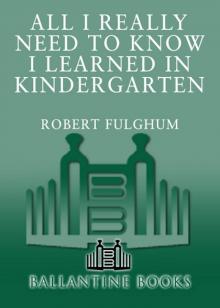 All I Really Need to Know I Learned in Kindergarten
All I Really Need to Know I Learned in Kindergarten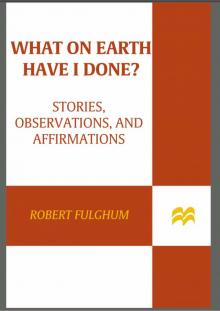 What On Earth Have I Done?
What On Earth Have I Done?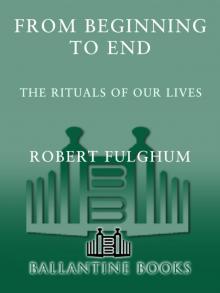 From Beginning to End
From Beginning to End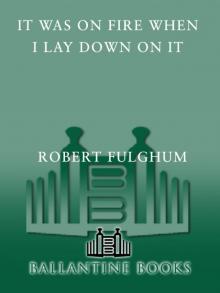 It Was On Fire When I Lay Down On It
It Was On Fire When I Lay Down On It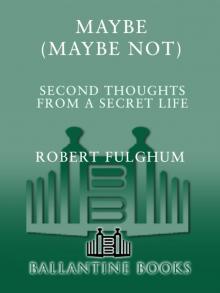 Maybe (Maybe Not)
Maybe (Maybe Not)